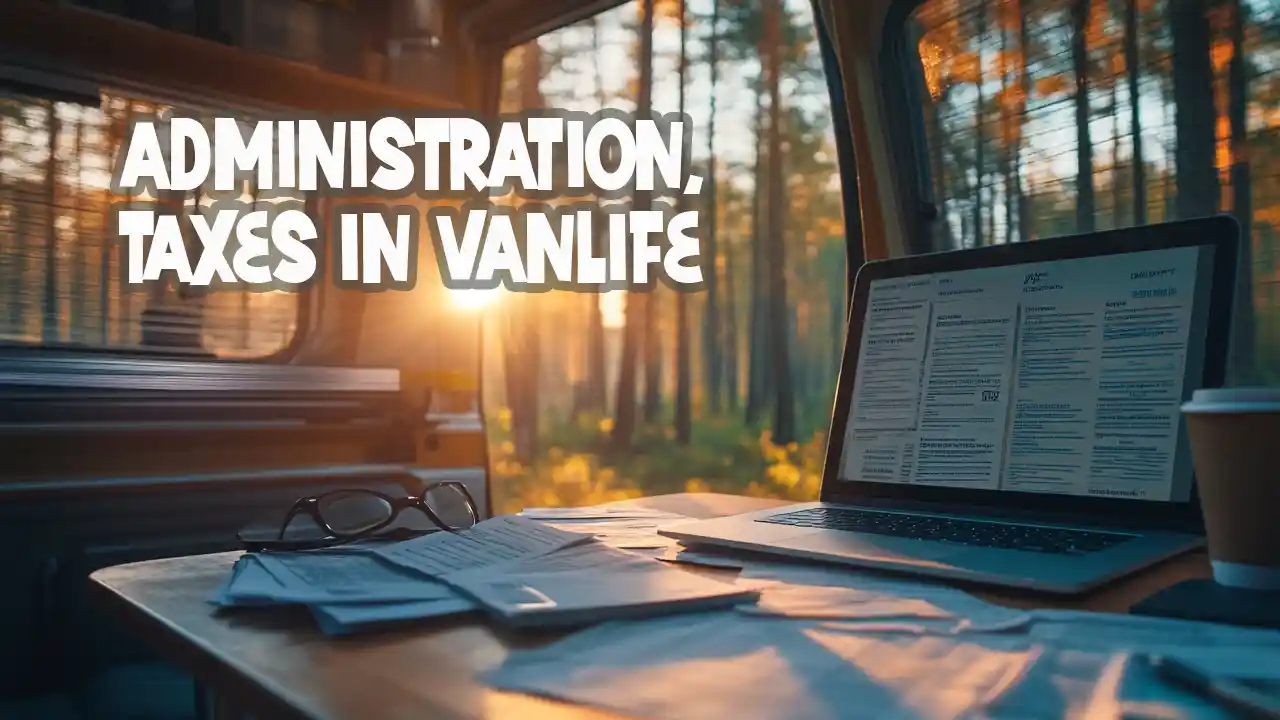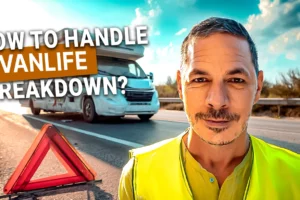
Taxation, Administration, and Taxes in Vanlife
Introduction
So, you’ve decided to leave everything behind and live the van life, but you’ll still need to keep one foot on the ground. The freedom of the open road is intoxicating, sure, but the administrative world doesn’t take a vacation. Taxes, address, mail…
These details might seem tedious compared to the call of adventure, but they’re essential for a smooth vanlife. Don’t worry, we’ll sort it all out together. Here’s what you need to know to travel peacefully while staying in good standing with the authorities.
Do You Have to Pay Taxes as a Nomad?
Oh yes, sorry to shatter your dreams of total freedom, but even as a nomad, you can’t escape taxes. That’s how it is, wherever you are, whether you use public services or not, you remain liable to your last country of tax residence. Practically speaking, if you’re British and decide to travel the world in a van, you’ll continue to pay your taxes in the UK unless you meet the conditions to be a non-resident under the Statutory Residence Test. In the US, as long as you meet the substantial presence test or hold a green card, you’ll be taxed on your worldwide income.
And be careful, changing your tax residency isn’t as simple as deregistering from your old address; you must prove that you’ve genuinely established your center of interests elsewhere. (So no, spending three months on a beach in Bali doesn’t make you fiscally Indonesian!)
You might be thinking:
“But I no longer use the roads, schools, or hospitals of my country, so why should I keep paying?”
I understand your point of view, but look at it differently. Your country has educated, trained, and treated you for years; it’s a bit like a moral debt you continue to repay. And who knows? One day you might need to return home and benefit from these services again.
Also, even if you travel, you still use public infrastructures: the roads you drive on, the parking lots where you stop, the beaches where you relax… All of this is maintained thanks to taxes. So, by continuing to pay, you contribute to the upkeep of these places you love so much.
Moreover, maintaining a fiscal link with your home country also means preserving your civic rights. It allows you to keep voting, to have a say in the decisions shaping your country, even if you don’t live there every day. (It’s pretty cool to be able to complain about the government with full knowledge of the facts, isn’t it?)
What Address to Use When You’re a Nomad?
The eternal question of the address when living on the road! In fact, you need two types of addresses: a postal address and a tax address. Yes, I know, that’s a lot of addresses for someone without a fixed home!
Let’s start with the postal address. This is the one you’ll use to receive your mail, Christmas packages from Aunt Jacqueline, and most importantly, for your bank to send your new card when the old one expires (because yes, even in vanlife, we need money, what a disappointment!). For that, you have several options:
- Ask a friend or family member to receive your mail (and promise them postcards in return)
- Use a traveler’s mail service (sure, it’s paid, but at least you can be sure no one will snoop through your bank statements)
- Opt for general delivery if you pass through the same place regularly
Now, let’s talk about the tax address. This is the most important one because it determines where you’ll pay your taxes (yes, it always comes back to that). It’s also the address you’ll use for your official documents, voter registration, etc. In short, it’s your administrative anchor in society.
The thing is, these two addresses can be different. You can very well have your tax address at your parents’ place and have your mail sent to your best friend. The main thing is that you always have a way to retrieve your important documents and that the administration knows where to find you (even if you don’t always know where you are!).
UK Tax Residency
In the UK, tax residency is determined by the Statutory Residence Test (SRT). You are considered a resident if:
- You spend 183 days or more in the UK during the tax year.
- Your only home is in the UK for at least 91 consecutive days, and you spend at least 30 days there within the tax year.
- You work full-time in the UK for at least 365 days (GOV.UK) (GOV.UK).
US Tax Residency
In the US, your tax residency status is determined either by holding a green card or by meeting the substantial presence test, which considers the number of days spent in the US over the current and previous two years. US citizens and residents are taxed on their worldwide income, regardless of where they live
These rules help ensure you manage your taxes properly, even while enjoying the freedom of vanlife.
How to Have a Tax Address When Living in a Motorhome?
Finding a tax address when living in a motorhome is like finding an anchor point in an ocean of freedom. Fortunately, there are several solutions to maintain an administrative foothold while driving towards the horizon.
Firstly, remember we are talking about your personal tax address. If you run a business during your vanlife, that’s a different story. (We’ve even prepared a special article on business domiciliation in vanlife, check it out if it applies to you.)
Let’s start with the simplest option: domiciling with a friend or family member. It’s like asking your sister to take care of your hamster, except she’s taking care of your papers. The advantage? It’s free and easy to set up. The downside? You might owe them quite a few favors in return. It could also have tax implications for them, so make sure they fully understand what they’re agreeing to.
If you don’t have a friend or family member willing to play mailbox, don’t panic! There are alternatives like the USPS General Delivery or Canada Post General Delivery. This is a service where your mail can be sent to a local post office for you to pick up. You simply address your mail as follows:
Your Name
General Delivery
City, State ZIP
When you arrive at the post office, you can collect your mail with ID verification. This service is free but only holds mail for a limited period, usually 10 to 30 days.
For a more comprehensive solution, consider virtual mailbox services. These services provide you with a physical address where your mail is received, scanned, and uploaded for you to view online. They can also forward your mail to any location you specify. This is a more professional and convenient option, though it comes at a cost, typically between $20 and $50 per month.
In the UK, The Royal Mail’s PO Boxes and private mail forwarding services are popular options. Virtual mailbox services like UK Postbox offer comprehensive solutions including mail scanning and forwarding.
What Solutions for Receiving Mail in Vanlife?
As previously mentioned, receiving mail while living in a van can seem like a headache. But don’t worry, there are solutions to keep track of your correspondence, even when zigzagging across the country.
In addition to the previously mentioned options, let’s discuss mail forwarding services. In the UK and the US, several services provide this solution, allowing you to have your mail sent to a fixed address where it can be forwarded to you wherever you are.
In the UK, companies like Expost offer virtual street addresses with mail forwarding options. For as little as £0.60 per day, you get a physical address where your mail is received, scanned, and forwarded to you as needed. This service is suitable for those living full-time in motorhomes or caravans, providing a reliable address for personal or business correspondence.
In the US, you can use services like USPS General Delivery, where your mail is sent to a local post office for pickup. This service is free and can hold mail for up to 30 days. For those needing more flexibility, virtual mailbox services like Traveling Mailbox, Anytime Mailbox, and iPostal1 offer comprehensive solutions. These services provide a physical address, scan your mail, and allow you to manage it online. They can also forward your mail to any location, making it ideal for frequent travelers.
Another option is to use digital mail services. These services scan your mail and send it to you via email. No more paper piling up in your van! The downside? It comes with a cost, and you need a reliable internet connection.
Lastly, let’s not forget the good old general delivery. It’s a bit old school, but it works! You choose a post office on your route, and your mail will wait for you there. It’s ideal if you have a regular stopping point in your travels.
How to Handle Administrative Tasks in Vanlife?
First of all, digitalization is your friend. Opt for digital versions of your documents whenever possible. Bills, bank statements, tax returns… More and more services offer this option. It’s eco-friendly (well, that remains to be proven, but let’s believe in the world of Care Bears), convenient, and takes up less space in your van than kilos of paper!
Next, consider proxies. This is something we rarely think about. It’s like having an administrative superhero acting on your behalf. You can give power of attorney to a trusted close one for certain tasks. This can be a real relief when you’re on the other side of the country or the world and need to sign an urgent document!
Lastly, don’t forget to plan your returns for important tasks that require your physical presence. Passport renewal, van inspections (MOT in the UK and state-specific inspections in the US)… (Yes, even your faithful steed needs a check-up from time to time!) Integrate these appointments into your travel itinerary.
What Are the Specific Tax Implications of Vanlife?
Vanlife offers the freedom of the open road, but the tax implications can be a bit more complex. Even when you’re traveling, the tax authorities keep track of you!
Starting with some good news: as a nomad, you can say goodbye to property and habitation taxes. In France, this means no “taxe d’habitation” or “taxe foncière” unless you continue to own property. Since you don’t have a fixed residence, these taxes don’t apply to you. That’s a win!
However, things get trickier if you’re a digital nomad. If you’re working online while traveling, the taxation of your income can become complicated. Generally, you’re still taxable in your country of tax residence (often where you have established your center of interests). So, even if you’re working from a beach in Thailand, you’ll still need to report your income to your home tax authorities.
In the UK, there is no direct equivalent to France’s “taxe d’habitation” or “taxe foncière” (youhou France Tax country). Instead, residents pay Council Tax, which is a local tax on domestic property. If you don’t have a fixed property, you typically wouldn’t be subject to this tax. For property owners, there’s also a property tax component called the Business Rates for non-domestic properties, but again, this wouldn’t apply to vanlifers without fixed premises.
In the US, property taxes vary significantly by state but are generally assessed on the value of real estate property. If you don’t own property, you won’t be liable for property taxes. However, property tax rates can be quite high in some states, like New Jersey and Illinois, and contribute significantly to local government revenues.
For digital nomads spending a lot of time abroad, you might be considered a tax resident of another country if you spend a significant amount of time there. Many countries have agreements to avoid double taxation, so you won’t be taxed twice on the same income. However, understanding and navigating these agreements can be complex and may require professional advice.



